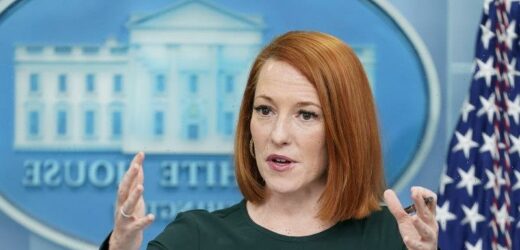The Biden administration’s decision on Thursday to tell the public that Vladimir Putin was likely to use chemical weapons in Ukraine shows the extent to which the US strategy to battle Russia’s disinformation has evolved.
Once upon a time, such intelligence would have only been shared with the top echelons of allied countries. But in the evolving East-West confrontation, declassifying secrets is proving good for democracy.
In the new warning, White House press secretary Jen Psaki said the US had noticed an uptick in false claims from Russia about “US biological weapons labs and chemical weapons development in Ukraine”, and those false claims could foreshadow Russia’s real use of the banned weapons against the country.
“Now that Russia has made these false claims, and China has seemingly endorsed this propaganda, we should all be on the lookout for Russia to possibly use chemical or biological weapons in Ukraine, or to create a false flag operation using them,” Psaki tweeted. “It’s a clear pattern.”
After years of being outwitted by Russia on the world stage of public opinion, the US has found a surprisingly effective new counter-tactic: strategically declassifying and sharing intelligence.
For example, the US declassified and shared information warning of Russia’s invasion of Ukraine in the months leading up to it. Itand the UK revealed that Russia had already positioned operatives to stage a fake attack and to install a pro-Russian leadership in Kiev. The US also repeatedly warned of “false-flag” operations to be staged by Russia as a pretext for invasion.
In contrast to the Kremlin’s famed use of internet trolls and bots to sow doubts in other countries, the US’s new strategy of sharing factual information has – at least for now – helped built trust between the US, its allies and war-hit Ukraine.
A November satellite photo shows a Russian troop location in Yelninsky, Smolensk region, Russia. Declassified US intelligence showed Russia was planning for an invasion of Ukraine.Credit:Maxar Technologies/AP
For more than a decade, democracies have struggled to convince their own citizens that they were operating in good faith.
In some case, the cynicism has understandable roots: the cooked intelligence seized on by the US to justify the 2003 Iraq War or genuine cynicism for Western power in the wake of the global financial crisis.
Putin and his partisans in the media have seized on those events and helped shape them – highlighting, and even exacerbating, the disorders through the dissemination of fake news, conspiracy theories and official statements.
Forewarned the invasion: White House national security adviser Jake Sullivan.Credit:AP
But in preempting Putin’s invasion, the US has drawn attention to Ukraine, ensuring journalists flooded the country in the weeks before the attack.
This has allowed the nation of 44 million, itself apt in strategic communication, to establish narrative control of the event through the journalists’ work or through genuine video footage by citizens.
The US also appears to have extended a similar strategy to China, with US officials revealing Beijing shared information with Moscow about meetings Chinese diplomats had with their US counterparts before the Ukrainian invasion began.
On Thursday, Psaki also called out Chinese officials for echoing Russia’s conspiracy theories.
The success of this “pre-bunking” tactic relies on sharing credible information to forewarn allies and the broader public of lies told by the Moscow regime.
US President Joe Biden speaks about the Russian invasion of Ukraine on February 24, 2022.Credit:AP
Whether Australia will embrace this tactic remains to be seen.
“It’s uncharted territory,” said John Blaxland who is professor of International Security & Intelligence Studies at the Australian National University. “But now that the US has done it, the prospect becomes more feasible.”
Forewarning the public about bad information to come has “been discussed at the individual level for years,” said Joshua Tucker, professor of Politics and Co-Director, Centre for Social Media and Politics at New York University. “Now we’re seeing this play out at a macro scale.”
“This is what the US is doing,” Tucker said. “It’s worked particularly well.”
The US government, even before it faltered in its ability to shape global narratives, relied on spin if not outright deception, in its involvement in the Iraq War, or in Vietnam, El Salvador and Cambodia.
But it was perhaps the Kremlin’s embrace of deception to interfere in the US 2016 presidential election (and in others around the world) that explains why the sizable disinformation research community in the West was surprised by the new tactic of declassifying intel for strategic advantage.
Many in that community have struggled to explain why Ukraine’s narratives have succeeded where Russia’s have so far failed – at least, outside Russia.
An explosion in Kyiv on the first day of the invasion.Credit:Office of the President of Ukraine
“We’ve gotten so hyper-focused on disinformation,” Tucker said, that we’ve missed the potential truth has to shape percentions.
The White House strategy has – for now at least – given the US the upper hand in the information war against Russia.
University of Richmond [Virginia] Associate Professor Stephen B.\ Long says there is potential for the declassification tactic “to become a long-term tool for states” if the intelligence services are widely seen as capable.
“That credibility is also something built up over time, so a series of intelligence failures could hamstring leaders wishing to use this approach in the future,” Long said.
The US strategy isn’t without risk. If Russia, after numerous White House warnings, didn’t invade Ukraine, the disclosures could have been seen as yet more untrustworthy information.
Moreover, trust in information can be easily damaged, if for example, classified information is leaked for narrow partisan gain.
If anything, the strategy of declassifying intelligence around Russia’s intentions has given the US a taste of something it hasn’t known in years: some control of the international narrative.
Professor Fred Hoffman, who lectures in strategic communication at Mercyhurst University in Pennsylvania, says that “controlling the narrative is much harder to accomplish if you’re a liberal democracy”.
“Authoritarians are able to basically dictate to their minions and their media what the message is, what to say.”
Liberal democracies, instead, will have their claims debunked if they don’t stick to the truth.
Hoffman, who served in the US Army as a public affairs officer during the Cold War, said in that role he was under strict instructions to never lie to the public.
“The reason we could not lie was because credibility was everything.”
Get a note directly from our foreign correspondents on what’s making headlines around the world. Sign up for the weekly What in the World newsletter here.
Most Viewed in World
From our partners
Source: Read Full Article






